2.5 Learning Type CEUs
The Empowered BCBA: Strategies for Preventing and Managing Burnout and Compassion Fatigue
Learn to love your career again!
Learn to love your career again!
Instructors: Amelia Dalphonse, MA, BCBA and Nicole Dionne, MA, LCMHC, BCBA
Amelia Dalphonse, MA, BCBA, co-founded Master ABA with her twin sister, Dianna Kelly, bringing over 13 years of expertise in Applied Behavior Analysis (ABA). Passionate about prioritizing client needs, Amelia earned a Master’s degree in ABA and became a Board Certified Behavior Analyst (BCBA).
At Master ABA, Amelia and Dianna lead with innovation, emphasizing client-centered care to drive meaningful change. As an ACE provider, they’ve established the institution as a hub for progressive ABA practices, inspiring others to adopt compassionate and ethical approaches.
Through her role at Master ABA, Amelia advocates for advancing the ABA field with empathy and integrity. She stays abreast of the latest research, continuously seeking opportunities for professional growth.
Amelia’s leadership and dedication continue to shape the ABA community, empowering practitioners to prioritize client well-being. Together with her sister, she envisions a future where ethical values drive positive change in ABA practices.


Nicole Dionne is a Licensed Clinical Mental Health Counselor based in Greenland, NH, with over 19 years of experience in the mental health field. She emphasizes the importance of collaborative relationships and acknowledges the inherent strength within each individual who seeks her guidance. Dionne’s primary objective is to create a secure environment conducive to processing and overcoming life’s stressors.
Her services cater to individuals spanning from early childhood through adulthood. Dionne specializes in perinatal, prenatal, and infant mental health, focusing on early intervention. Additionally, she is proficient in working with a neurodiverse clientele, addressing conditions such as autism, ADHD, and various intellectual and neurodiverse presentations.
Why is The Empowered BCBA: Strategies for Preventing and Managing Burnout and Compassion Fatigue important?
After less than a year, my job was literally making me sick.
I had been so excited to start my new role as a clinical director, but in just a few months it was taking a physical toll on me. The endless demands, unreasonable expectations, having to defend every single decision I made. I couldn’t do it anymore. The stress was so bad I could barely get out of bed some mornings.
I talked to my husband and we made the difficult decision that I should leave the company even though I didn’t have another job lined up. This had a huge financial impact on us, but risking my health wasn’t worth the money.
Looking back I realize what I was experiencing was burnout. If I’d had the tools and resources, I could have managed the situation without endangering my health.

What’s Included with The Empowered BCBA: Strategies for Preventing and Managing Burnout and Compassion Fatigue?

Act now, and you can get The Empowered BCBA: Strategies for Preventing and Managing Burnout and Compassion Fatigue – plus get these exclusive bonuses!

See what People Are Saying

The Problem with the Field of ABA
Board Certified Behavior Analysts (BCBAs) play a critical role in overseeing and implementing ABA strategies for individuals in need. However, recent trends have shown an increasing number of BCBAs leaving the field, raising concerns about the sustainability of ABA as a profession. Several factors have been identified as contributing to this high turnover rate among BCBAs, including

But that’s not the end of it—the problem’s actually worse than that!
The demand for ABA services is higher than ever, but quality practioners are fleeing the field at an alarming rate!
Frequently Asked Questions
How is the training different from a regular CEU course?
Will I get a certificate of completion?
How many CEUs do I earn by completing the training?
How long do I have to complete the training?
This website uses cookies to provide you with the best experience possible. By continuing, you agree to the terms of our cookie policy.
Let me know about the next cohort for Your First Steps to Freedom!
Feel free to download these instructions to keep as you walk through the process.
Before you enroll in a Game Plan, the Game Plan section of the Dashboard will show you this:
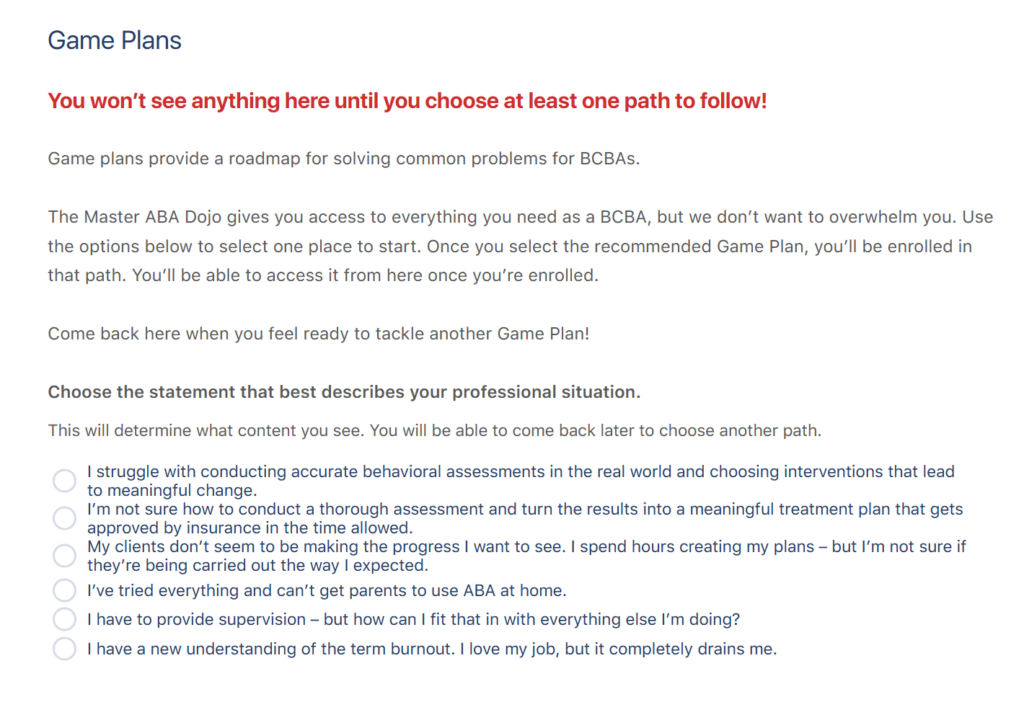
When you click on one of the 6 statements, you’ll see a button for the related Game Plan. Click on the Game Plan name:
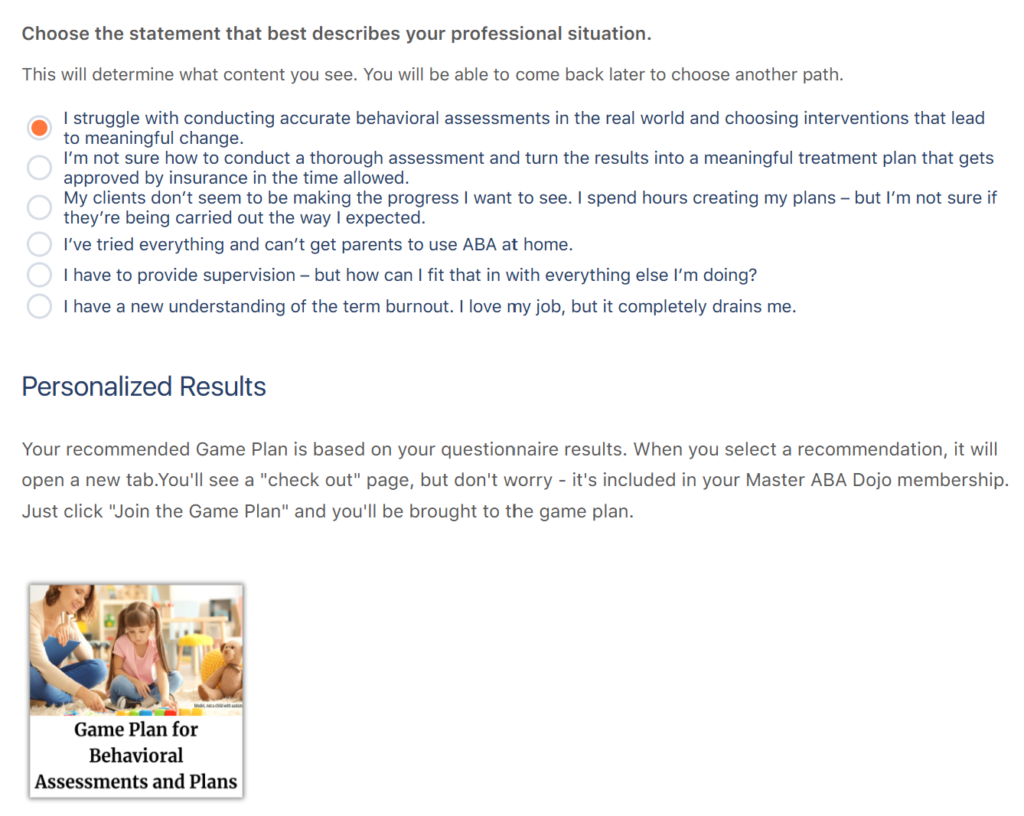
You’ll be brought to the enrollment page. You must click the checkbox for the terms and conditions – these are the same you agreed to when joining the membership.
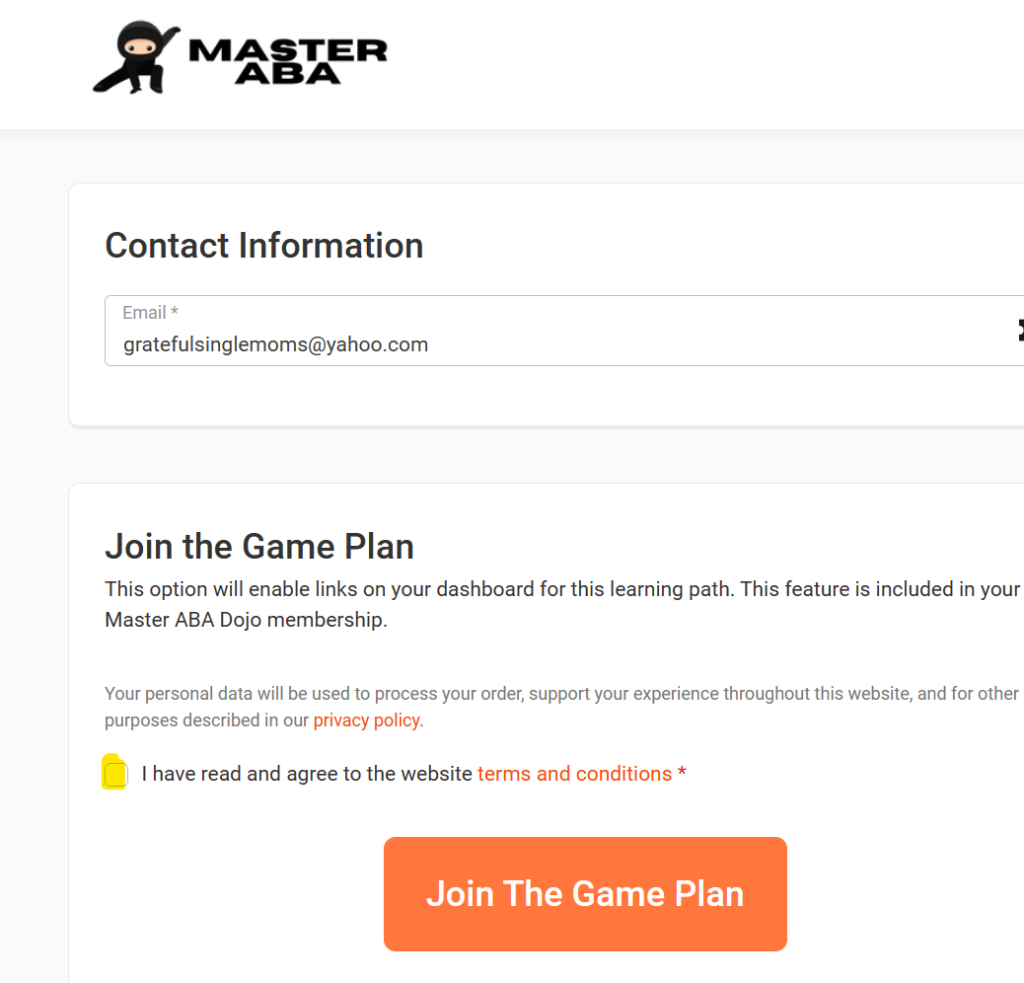
You’ll be brought to the Game Plan page. Here you can complete a self-assessment to identify relevant strengths and weaknesses. You can then complete related courses. At the bottom of the Game Plan page, you’ll also find related resources such as guides, templates and checklists:
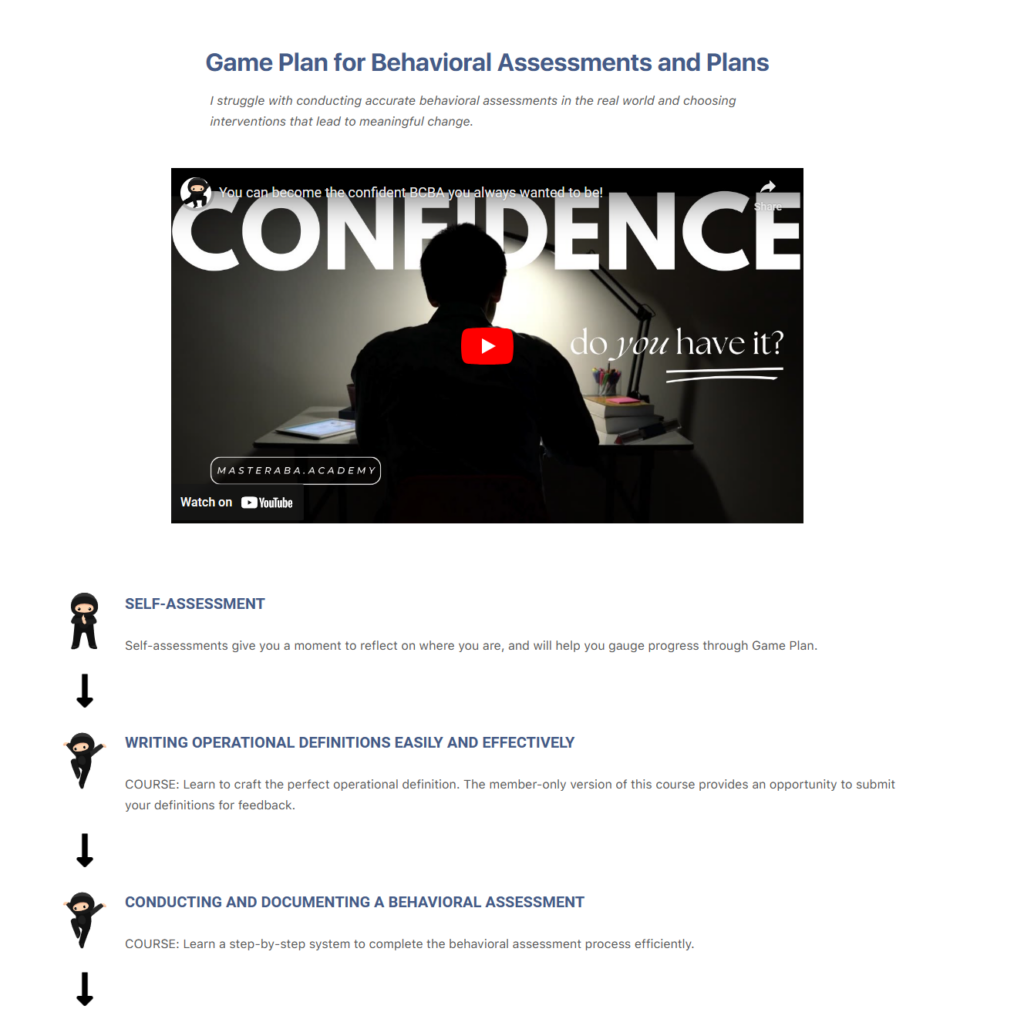
When you navigate back to the dashboard, you’ll have an option to add a new Game Plan (we recommend you go through your first Game Plan before adding more). When you click the button, you’ll get a pop up with the same 6 questions. Choose a different response to add a different Game Plan.
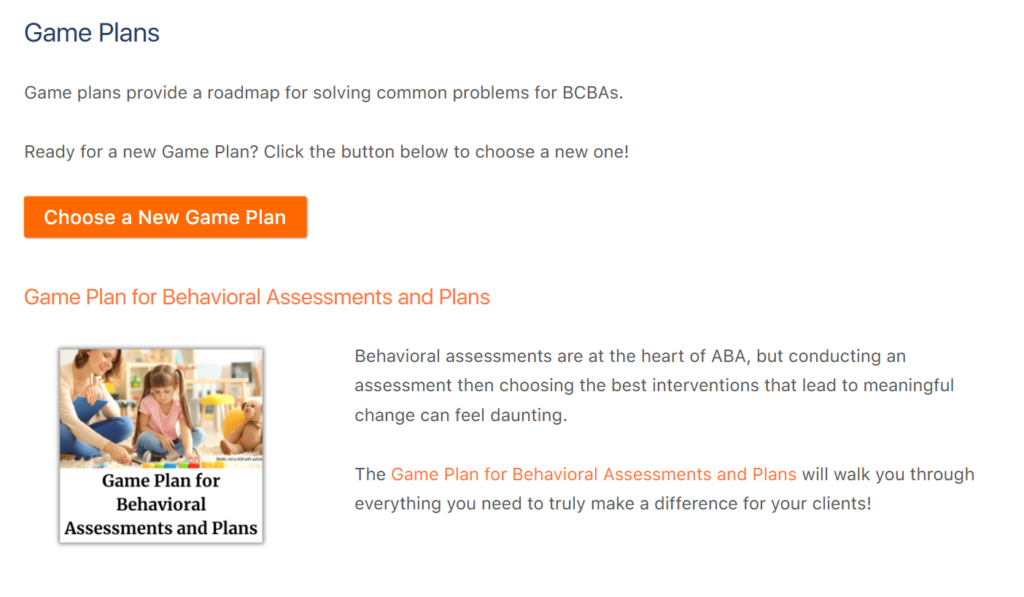
You must be logged in to access the Member Onboarding features.
1. Collapse the left hand navigation panel to create more space on the page:
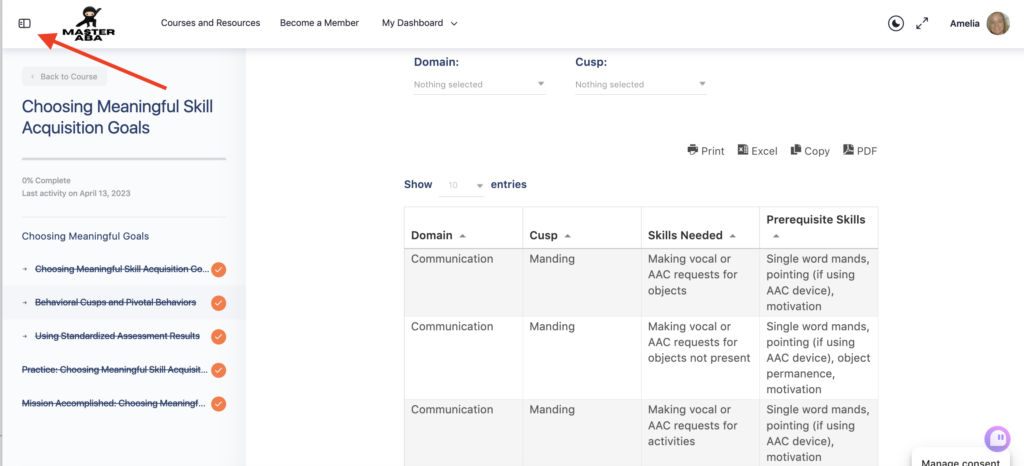
2. Use the filters to limit the number of rows in the table:
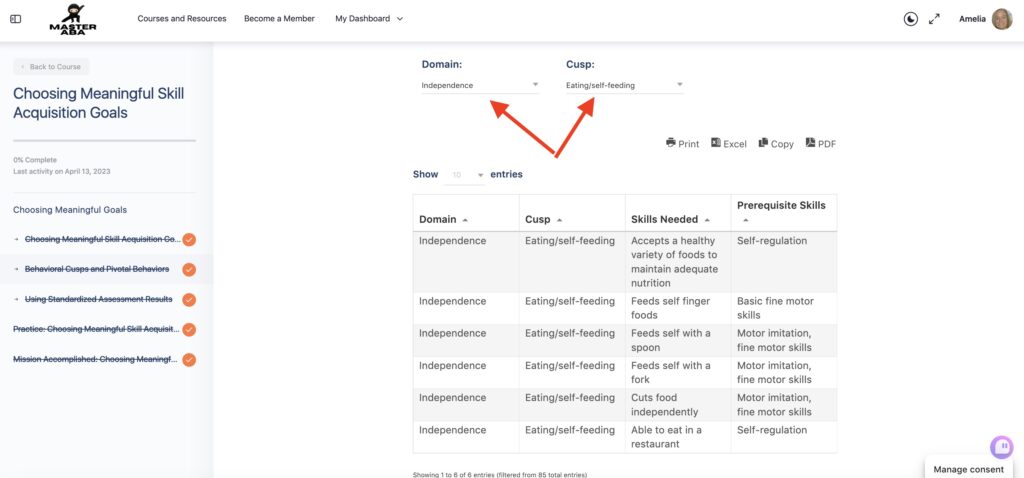
3. Export the table to either PDF or Excel to save the results:
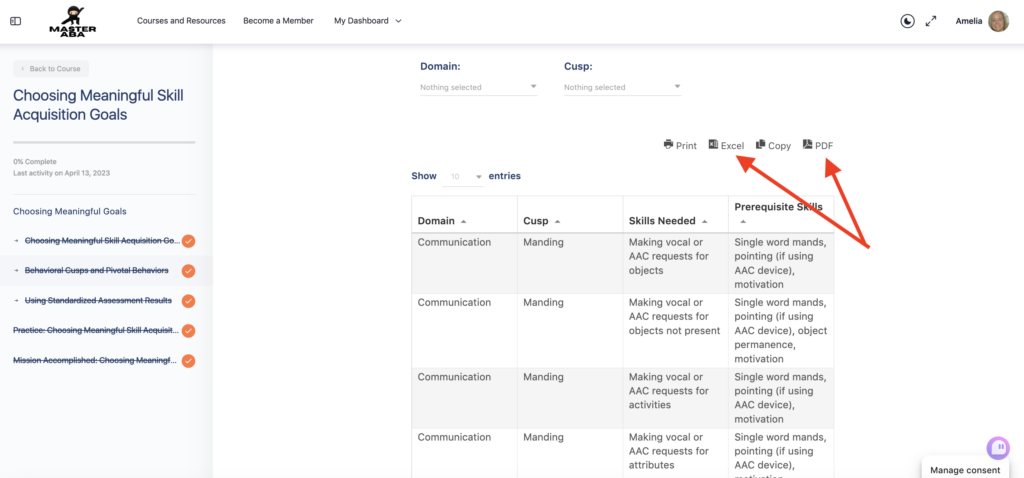
Selecting Orders or Edit My Account will bring you to a new page. Click the Home icon in the top left to return to My Dashboard.
There was a problem reporting this post.
Please confirm you want to block this member.
You will no longer be able to:
Please note: This action will also remove this member from your connections and send a report to the site admin. Please allow a few minutes for this process to complete.